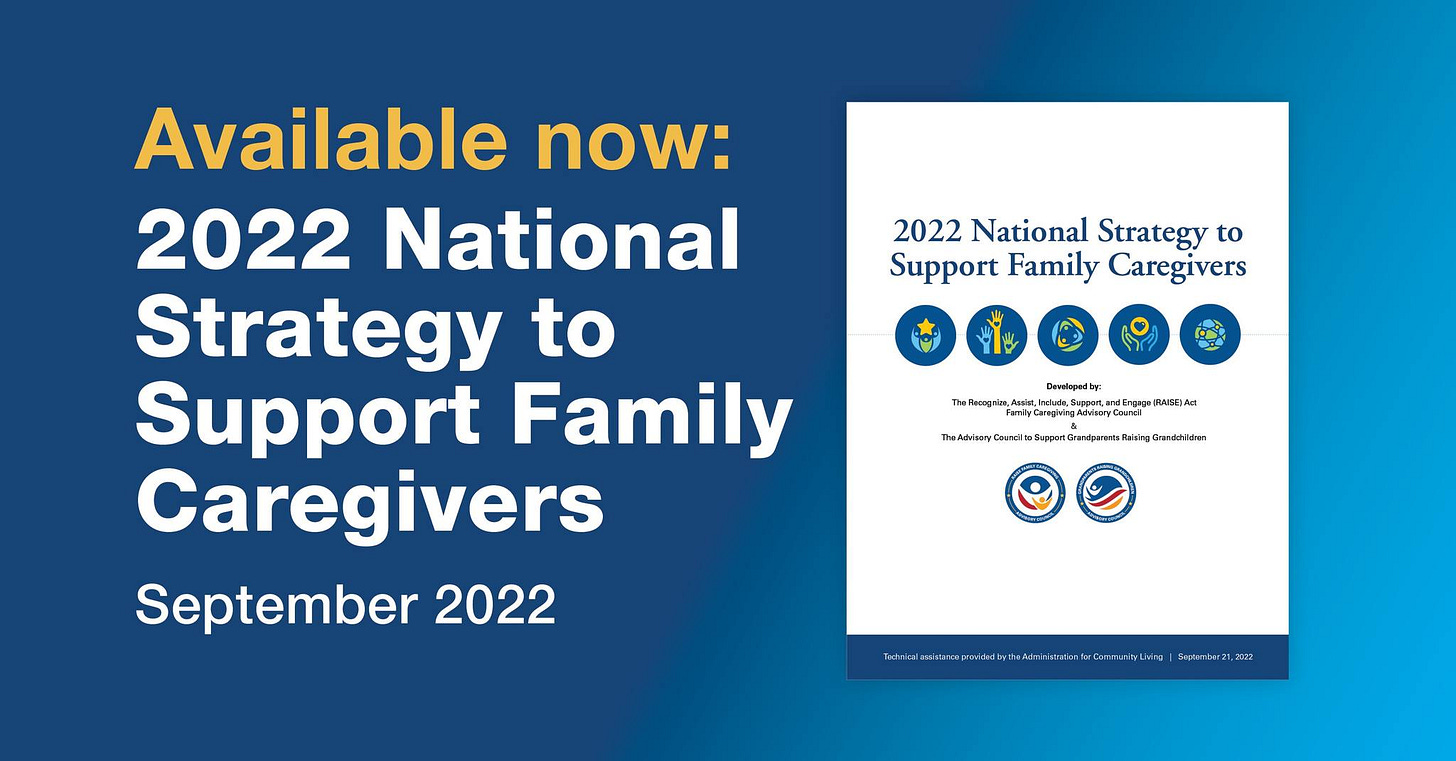National Strategy to Support Family Caregivers - what does it mean for all of us?
PRESS RELEASE: KIRC backs federal efforts to bolster support for caregivers

Keeping It REAL Caregiving BACKS NATIONAL STRATEGY TO SUPPORT FAMILY CAREGIVERS
-Plan includes commitment from 15 federal agencies to implement nearly 350 actions-
Washington, D.C. (Sept. 27, 2022)—The U.S. Department of Health and Human Services has released a national strategy developed by two congressionally mandated councils detailing nearly 350 actions the federal government will take in the coming years to support family caregivers.
The 2022 National Strategy to Support Family Caregivers includes more than 150 actions that state and local governments, public health departments, philanthropies, and community-based, faith-based, and nonprofit organizations can take immediately to support the nation’s 53 million caregivers who make up 21% of the population.
Keeping It REAL Caregiving fully supports the latest efforts to raise awareness to the REAL challenges, and needs of the millions of family caregivers across the country.
Since the launch of Keeping It REAL Caregiving in 2021, the goal has been to capture and share stories of those living this experience. The introduction of a National Strategy now opens the door for greater reach of education, awareness and delivery of much-needed resources and support.
“The 2022 National Strategy provides a much-needed whole-of-society approach to assist family caregivers, and is a step towards more fully recognizing the role family caregivers play in our society,” said Julia Yarbough, Creator of Keeping It REAL Caregiving. “KIRC is honored to play a role in sharing more of this information with the general public. We look forward to reviewing the strategy, publicly committing to recommended actions, and ensuring relevant local organizations and government entities are aware of the role they must play in supporting family caregivers.”

The National Strategy includes government actions that address issues that caregivers say are most important, including:
Access to Respite Services: AmeriCorps Seniors will offer professional short-term care to help family caregivers take a break;
Support with Day-to-Day and Complex Medical Tasks: Offices throughout the government will coordinate with states to grow and strengthen the direct care workforce to help more family caregivers with caregiving tasks;
Inclusion of Caregivers in Care Teams: The Centers for Medicare and Medicaid Services will update rules to include family caregivers in the hospital discharge planning process so transitions are smoother for all involved;
Financial Education on Caregiving Costs: The Consumer Financial Protection Bureau will increase the availability and use of financial education tools on the costs of long-term care so caregivers can better prepare;
Better Identification of Family Caregivers: Departments across the government will pilot identification of family caregivers in electronic health records and state information systems and conduct localized outreach to share information with family caregivers about the support available;
Research on the Needs of Family Caregivers: Interdepartmental efforts across the federal government will research family caregiving to inform evidence-based policies, including by providing grants to colleges and universities with gerontology and family service programs so support options meet family caregivers’ needs.

Interested individuals and organizations can provide public comment on the National Strategy beginning on Oct. 1.
The Strategy will be updated biennially, informed in part by public feedback, ensuring it continues to meet the needs of family caregivers and those they care for as they evolve.
The National Strategy was developed jointly by the RAISE (Recognize, Assist, Include, Support, and Engage) Family Caregiving Advisory Council and The Advisory Council to Support Grandparents Raising Grandchildren—both comprised of family caregivers, healthcare experts, advocates, and others—with technical support from the Administration for Community Living.
The John A. Hartford Foundation and the National Academy for State Health Policy provided support to the RAISE Family Caregiving Advisory Council through resources, technical assistance, and policy analysis.
# # #
About Keeping It REAL Caregiving
Keeping it REAL Caregiving creator Julia Yarbough, spent 20-years taking the lead ensuring her mother, Miss Nellie could live her last chapter feeling safe, loved and well-cared for.
Through personal experiences in caring for Miss Nellie, Yarbough realized our current systems and frameworks for family caregivers often fall short of the practical help people need most. To help others navigate the often rough waters of family caregiving, Yarbough created Keeping it REAL Caregiving.
KIRC strives to offer guidance, support, practical information and the opportunity to become more involved in advocacy efforts for our elders and ourselves: the next generation who will need care in our golden years.
About the Advisory Council to Support Grandparents Raising Children
The Supporting Grandparents Raising Grandchildren (SGRG) Act, (Public Law 115-196) authorized establishing an advisory council to identify, promote, coordinate, and disseminate information, resources, and best practices available to help grandparents and other older relatives meet the needs of children in their care while maintaining their own physical, mental, and emotional health. The council is composed of grandparents, professionals working in the field of supports and services to grandparents and the children they care for, and representatives of the federal agencies that serve these populations. www.acl.gov/SGRG.
About the RAISE Family Caregiving Advisory Council
The Family Caregiving Advisory Council (the Council) was established by the Recognize, Assist, Include, Support and Engage (RAISE) Family Caregivers Act and convened for the first time in August 2019. The Council includes representation by federal agencies and 15 voting members, including family caregivers; older adults who need long-term services and supports; individuals with disabilities; health care and social service providers; providers of long-term services and supports; employers; paraprofessional workers; state local officials; accreditation bodies; veterans; and as appropriate, other experts and advocacy organizations engaged in family caregiving. The Council is charged with providing recommendations to the Secretary of Health and Human Services on effective models of both family caregiving and support to family caregivers, as well as improving coordination across federal government programs. For more information, visit www.acl.gov/RAISE.
More to come this week on the National Strategy and steps YOU can take to make sure your voice is heard!
Until next time~




